A review of Butcher Box, an online high-quality grass-fed, organic meat supplier. In this post I provide a review of Butcher Box and also discuss the reasons why I eat meat.
My fellow carnivores! Do I have a treat for you?!
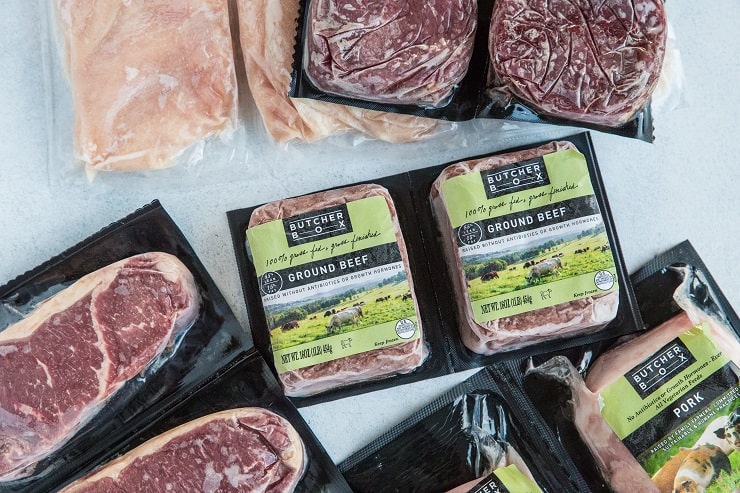
I eat a lot of animal protein…every single day. I want to give you a little background as to why I choose to consume meat, but first I want to tell you all about Butcher Box. Have you tried it yet?
What is Butcher Box?
Butcher Box is an online-based company that sources the highest quality 100% grass-fed, grass-finished beef, heritage breed pork, and organic free-range chicken. Their meat is always antibiotic-free and humanely raised without hormones. Learn more about how Butcher Box sources its meat HERE.
You can place orders any time you’d like or have a monthly subscription (which comes with perks!). This is a no-obligation or commitment service, so you can order as frequently or infrequently as you’d like. The product is absolutely amazing, the service is so convenient, and the best part about all of it? It’s AFFORDABLE!
The product is packaged well in dry ice and arrives at your doorstep frozen, so you never need to worry about it thawing in transit. Once you receive your order, you can freeze your meat or thaw it for use. ButcherBox.com has plenty of recipes for your convenience, or you can always fire up the google machine to get recipe ideas.
How it Works:
Step 1: Select your Box: Butcher box has some pre-curated boxes you can choose from (for instance, all beef, beef + chicken, beef + chicken + pork, beef + pork, etc.), or you can customize your own.
Step 2: Your Order Ships: Your beautiful box of meat arrives at your doorstep, ready for you to use or freeze.
Step 3: FEAST! Enjoy your favorite meals using Butcher Box’s amazing meat, and explore new dishes.
For my first order, I chose a mixed box, which included beef, chicken, and pork. Because I don’t discriminate when it comes to animal protein, I’ll likely continue ordering a mix.
Discounts & Promotions:
If you place an order through THIS LINK, you will get $15 off you first order, a free package of bacon, and free shipping.
Head over to ButcherBox to place your first order!
Okay, now we can get a little personal.
Why I Eat Meat
The short answer to this is I’ve never not eaten meat, but part of being a responsible human is continuously making informed decisions, so I figured I’d deep dive into my whys.
My food philosophy is to eat according to what YOUR body needs and likes to process. For some folks, this means being able to eat anything under the sun and still have stellar health, and for some folks, this means restricting certain foods. I look at food from a wellness standpoint, as I have a great deal of food intolerances. After years of trying to follow the herds and paying the price for eating things that upset my body, I resolved to simply eat what makes me feel well.
My diet consists of animal protein, non-starchy (low-FODMAP) vegetables, and sometimes rice and quinoa. Occasionally, I’ll have aged cheese. When you’re eating something every day, you want to be sure you’re sourcing it very wisely. For someone like me who uses animal protein as a staple, it wouldn’t be wise to pick up any ol’ meat at the grocery store day-in and day-out, which is why I’ve chosen to pair my Butcher Box review with this topic.
There are four primary reasons why I eat meat:
- It helps keep my IBS symptoms under control – Animal protein makes up a significant portion of my calorie intake and does not cause IBS flares because it doesn’t provide easily accessible fuel to bacteria the way carbohydrates and sugar do (learn more about this here).
- Quality protein (antibiotic-free, hormone-free) keeps my hormones in check.
- I need protein to fuel and recover from my exercise and workouts.
- Eating animal protein is intuitive for me. I love the way it tastes, the way my body processes it, and having it be a part of my diet feels natural.
Let’s dig a little deeper.
IBS, Candida, and Macros
As many of you know, I keep my IBS at bay by eating a low-to-moderate carb paleo diet. Most grains, sugar, dairy, and various starchy vegetables cause GI upset that takes days and sometimes weeks of recovery.
For this reason, a Low-FODMAP paleo (and sometimes keto) diet is what makes my body feel energetic and strong, keeps my spirits high, and generally ensures all my organs are functioning the way they should.
When I’m experiencing an IBS flare, I drop raw vegetables, go as low-carb as my body wil let me, limit my vegetable intake altogether, and eat mostly meat and fat. In this sense, my best bet is to stay away from fermentable carbohydrates so that I can stick to a daily regimen of meat and veggies without having to deal with IBS symptoms and further restrict my food intake.
Folks in the Dietetics world may claw at their eyeballs when they read discussions favoring low carbohydrate, but to those folks I say, walk a mile in the shoes of (or sleep next to) someone with IBS. A higher fiber and/or carbohydrate diet worsens gut conditions like IBS, IBD, leaky gut, candida, and SIBO because it feeds bacteria and parasites, causing inflammation and symptoms to go haywire.
Since vegan sources of protein cause IBS flares for me, I require animal sources versus plant-based, and due to the fact that I love eating meat, it just makes sense all-around to go animal.
As a side note to this, my gut health is something I’m actively working on, so I do hope one day I’ll be able to eat a larger variety of foods, including higher-FODMAP fruit and vegetables, beans, and legumes.
Hormonal Balance
In addition to controlling IBS through food, I have also kept a watchful eye on my hormones over the last year. Out of a holiday-inspired sugar binge, I became estrogen dominant for the first half of 2018. For me, higher levels of estrogen caused acne, weight gain that was difficult to shed, depression, GI issues, brain fog, and low energy.
You need complete protein to make progesterone…it’s as simple as that. If your body isn’t generating enough progesterone relative to estrogen, you become hormonally imbalanced, which in turn adversely affects many systems in your body. It is so easy to become estrogen dominant because many beauty and household products mimic estrogen when they are absorbed through your skin, and high-carbohydrate processed foods have the same effect.
Blood sugar swings can cause hormonal imbalance and inflammation in your gut, which can invite a whole host of not-so-fun issues. Stabilizing your blood sugar through a mindful diet is one of the smartest moves you can make for your health.
Does this mean you need to go ultra low-carb? NO. Does it mean you need to drop everything now and eat a pound of meat? No. It simply means you want to avoid spiking and dipping your blood sugar on a regular basis. The best way to do this is to make sure you’re eating balanced meals that aren’t too high in carbohydrates and also knowing your carb tolerance. Aiming for a no-to-low-sugar diet is wise if you have a history of hormonal imbalance, mental illness, and/or chronic gut issues.
Some of my takeaways from balancing my hormones is to steer clear of sugar (truly, I just do better when I stay away from the stuff altogether. If you’re a Gretchen Rubin fan, you’ll know what I mean when I say I’m an abstainer), make sure I’m getting adequate protein, exercise daily but not too vigorously, and take in plenty of omega-3 fats.
Exercise and Overall Health
Lastly, I choose to eat meat because I exercise regularly – I do HIIT workouts which include strength training, run, mountain bike, and yoga. When you work out, especially with strength training, you break down muscle. In order to repair and build muscle, you need protein. I look at mealtime in two ways: I eat to control inflammation, and I eat to fuel my lifestyle.
Can you achieve this with vegan sources of protein? Absolutely, although I will say it’s a bit harder to hit your mark since vegan sources of protein aren’t as densely packed. As I already mentioned, every form of vegan protein worsesns my IBS symptoms (gas, bloating, and constipation), so again, I rely on animal protein to fuel my adventures.
As an offshoot of this, protein is very satiating. When you’re athletic or highly active, you look for meals that will not only hit your macro and micro targets, but will keep you feeling full. For me, adequate protein is my best shot at staying satisfied and full without having hangry blood sugar swings.
Muscle density is one of those facets of health that needs continuous attention, especially if you’re female. Women begin to lose muscle mass rapidly as they age so making sure you continue to maintain or strengthen your muscles is an awesome insurance policy for being able to stay active as you age gracefully. Gaining and retaining muscle is both dependent on exercise and diet. It is generally recommended for women to strength train at least 2 days per week and take plenty of long walks in addition to any other physical activity (yoga, spin, running, hiking, biking, etc.) you enjoy.
Intuitive Eating
Eating does not come intuitively for me. When left to my own devices, I eat WAY too much sugar (I’m addicted to it). The one facet of my food intake that DOES come intuitively for me is animal protein. I crave it daily, and I give my body the amount it wants. I have found eating too much animal protein stops me up, but I usually get full before I can overdo it.
In this sense, so long as I listen to my desire for protein and focus on protein first, I have a better shot at eating my other macros (fat and carbs) intuitively.
Now that we have the medical background behind my continuous decision to eat meat is squared away, I want to discuss how I source my meat. This topic is near and dear to my heart.
How I Source My Meat
Because the majority of my calorie intake comes from protein and fat, I am meticulous when it comes to sourcing. I choose grass-fed beef because it is more nutritious than grain-fed (see my discussion on Omega-3 fats below), plus I actually prefer the flavor of grass-fed over grain-fed. Similarly, I always go with organic free-range chicken, and quality pork.
Let’s talk about Omega-3 fats for a hot minute. Grass-fed beef is an awesome source for omega-3 fatty acids. I’ve spoken about this on my Instagram stories in the past, but for a short recap: one of the smartest things you can do health-wise is to be sure you’re balancing your omega-6s with omega-3s. You want to take in more omega-3s than omega-6s if possible to keep your inflammation under control.
Essentially, omega-3s help keep many systems in your body functioning stellarly – they are essential in balancing your hormones, are great for brain health, help fight and prevent disease, and ensure your organs stay unclogged and happy. While your body does alright with some omega-6 fats, they can be pro-inflammatory (especially for those with autoimmune disease), and cause long-term health issues when consumed in excess. Case in point: omega-3 fat is important (source).
I hesitate to discuss the ethics of eating meat because there are so many heated opinions and I feel the conversation is better suited for a different time and a different place (and likely conducted by someone who can articulate both sides of the story better than I can).
What I will say is the way animals are raised matters deeply to me and my decisions as a consumer reflect that. I choose to buy meat that is humanely-raised, grass-fed, pasture-raised, fed organic feed, or wild-caught. I have watched animals be humanely harvested and make my choices based on the quality of life and death the animal had. I believe being this careful benefits all parties involved. Plus, your body receives meat that was thoughtfully-raised so much better than the alternative.
For all the above mentioned reasons, I’m honored to buy my meat from companies like Butcher Box that put a great deal of care on animal welfare.
That about sums it up. Now you know my whys. Send me an email (Julia (at) TheRoastedRoot (dot) net) if you have any questions at all!
Be sure to check out Butcher Box and see if it’s a good fit for your diet and lifestyle!
Disclosure: This is not a sponsored blog post – I was not compensated for this review, but there are affiliate links to Butcher Box in this post. If you make a purchase through the affiliate links, I will receive a small commission. As always, thank you for your support!
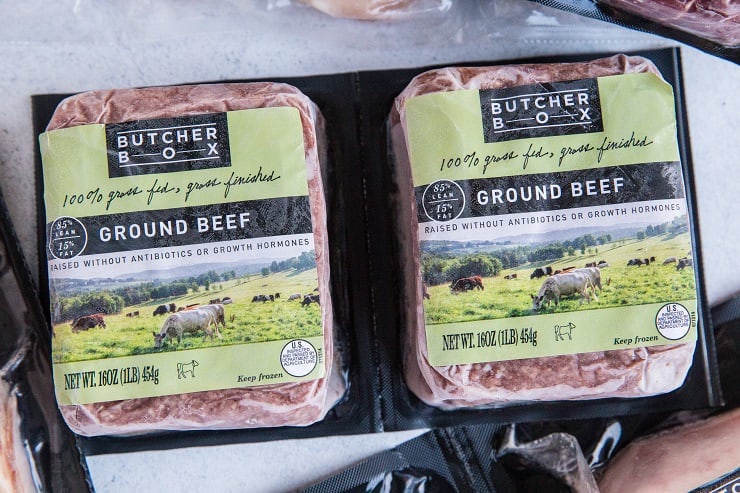






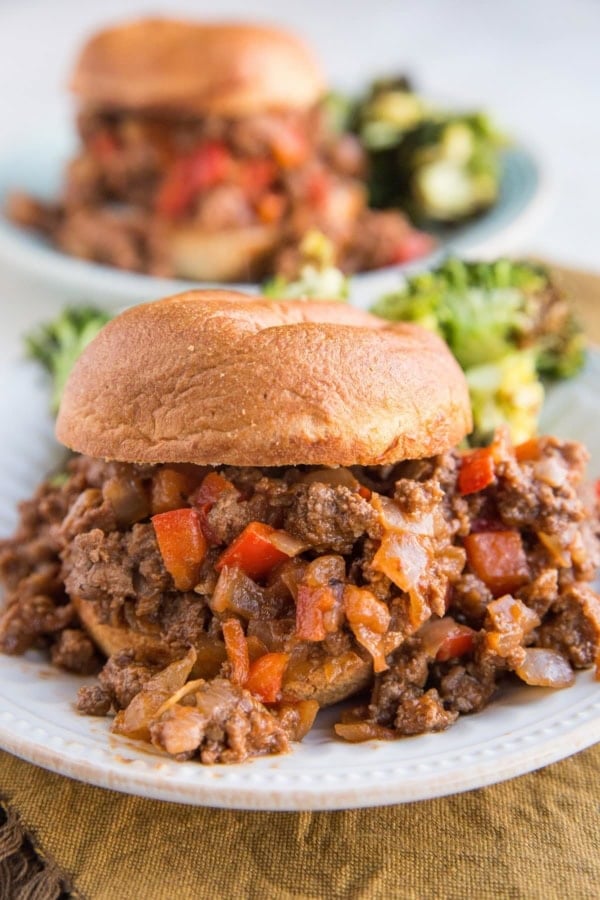

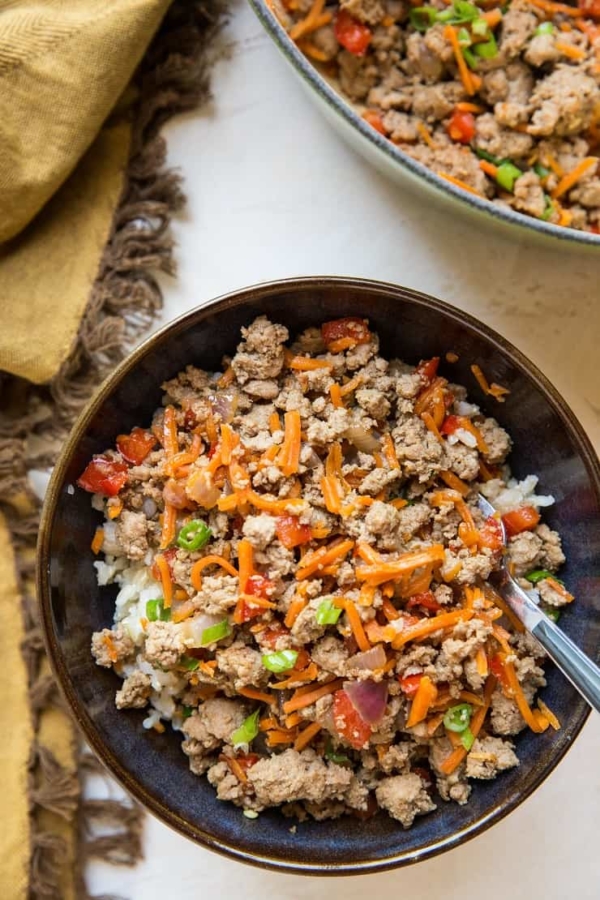










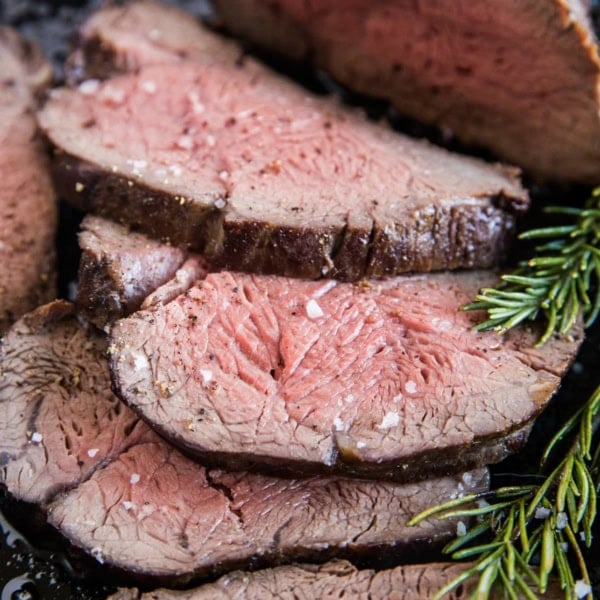

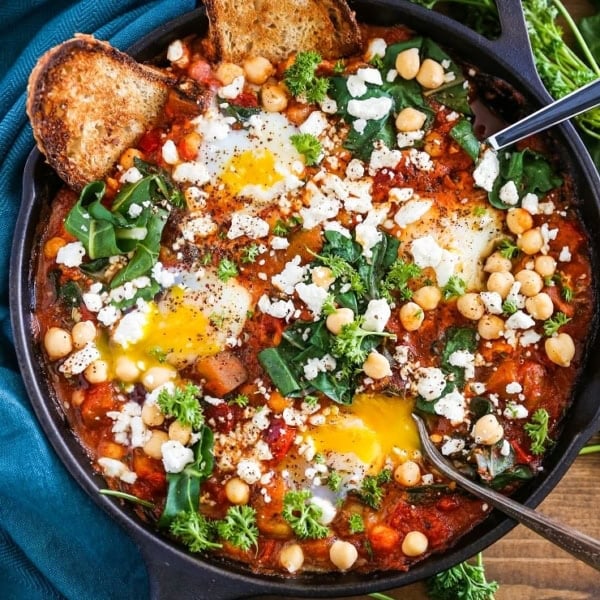
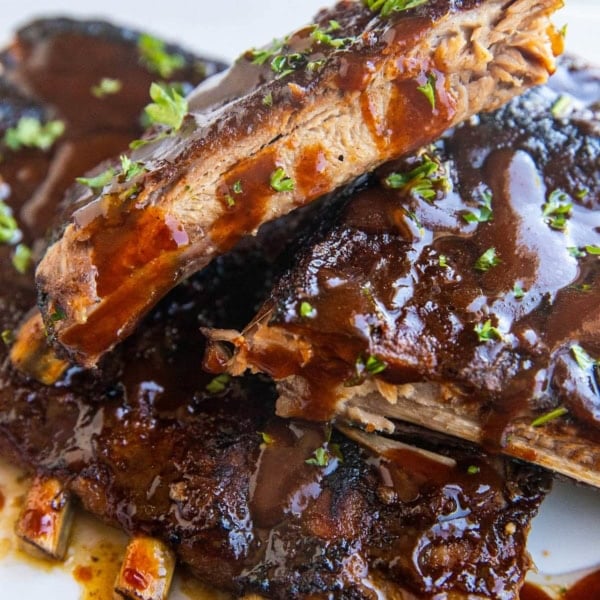

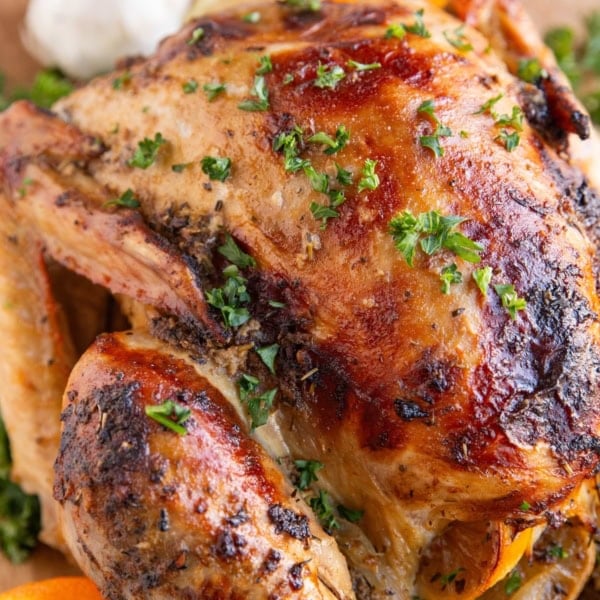
While I eat way more pulses, eggs, and tempeh than meat, I love running, and when I’m getting ready for a race, my performance is much better when I include red meat in my diet (I have a history of iron deficiency). The problem is, I don’t really enjoy its taste. I like ground lamb topping my Greek salad, pastrami sandwich, and an occasional burger, but that’s about it. I’m planning on making the lamb ragu which you linked in the spaghetti squash recipes, but do you have any suggestions how my chickpea-loving taste buds can start enjoying red meat?
While I haven’t eaten meat in 20+ years, I respect that some people feel like they need to eat meat for their bodies to run best. And I especially can appreciate how you choose to source your meat. IMO, eating high-quality meat is TOTALLY different than eating meat from McDonald’s or buying conventional meat from a regular ole food store. I think that your approach gives more respect to the animals you’re eating, is better for your health, and is a bit gentler on the planet too.